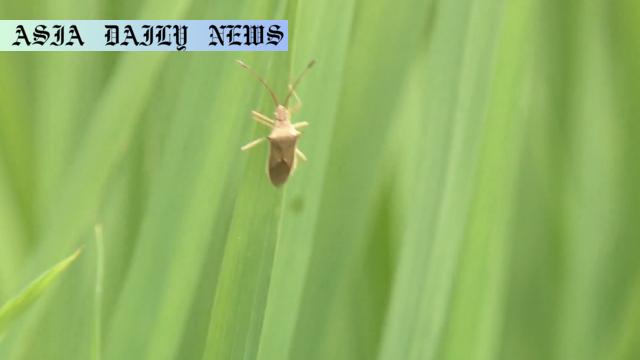Stink Bugs: Japan’s agriculture ministry warns that rising temperatures may trigger widespread stink bug outbreaks, threatening rice crops.

Heatwaves Fuel Stink Bug Outbreaks Across Japan
As global temperatures climb, Japan faces an unexpected agricultural challenge: the rising threat of stink bugs. The nation’s agriculture ministry has issued an urgent warning about these pests, emphasizing their potential to disrupt rice crops substantially. This phenomenon is strongly linked to heatwaves, which create the ideal environment for stink bugs to feed, breed, and expand their populations.
In the Hyogo prefecture, particularly in Kobe City, the alarm has been sounded for the second consecutive year. Farmers have been informed to remain vigilant as these bugs have been detected unusually early. Agricultural cooperative officials conducted surveys at 16 locations in the region, employing insect nets and visual inspections to assess the extent of the infestation. Their findings were concerning, as not only were stink bugs present, but their eggs were also discovered along paddies and peripheral areas. This development signals a critical threat, as these insects have commenced activity before the rice has even begun to produce grain.
The Science Behind the Outbreak
An analysis from pest control experts suggests a direct correlation between rising temperatures and the activity of stink bugs. Higher temperatures accelerate insect metabolism, encouraging them to consume more and reproduce at a faster rate. June’s unprecedented heatwaves in Japan are already bearing consequences, with early emergence observed this year. This active breeding cycle poses a significant risk not only to current crops but also to future harvests.
Stink bugs are notorious for inflicting severe damage on rice crops, a staple food and a vital component of Japan’s agricultural economy. Their feeding habits disrupt the development of rice grains, directly impacting yield and quality. With the pests’ presence confirmed even before grain production begins, it is a critical period for farmers and agricultural authorities to implement strict countermeasures.
Proactive Measures to Protect Crops
Authorities in the affected areas have taken initial steps by conducting detailed investigations and disseminating warnings to farmers. However, more action is required to mitigate the potential damage effectively. Farmers are encouraged to adopt integrated pest management strategies, which involve a combination of chemical interventions, physical barriers, and biological controls using natural predators of stink bugs. Continuous monitoring and early pest identification will be crucial to curbing the spread of these insects.
The stink bug crisis serves as a stark reminder of the profound effects of climate change on agriculture. Rising temperatures are not only altering ecosystems but also intensifying pest-related threats to food security. Collaborative efforts between scientists, policymakers, and farmers are required to devise sustainable strategies to combat agricultural disruptions caused by extreme weather conditions.
Conclusion: Lessons from the Crisis
The battle against stink bugs in Japan underscores the increasing vulnerabilities of modern agriculture to climate variations. While immediate steps to control pest outbreaks are vital, the need for long-term solutions cannot be overstated. Governments must invest in agricultural research to develop pest-resistant crop varieties and promote sustainable farming practices. On a global level, addressing climate change remains paramount to mitigating its cascading impacts on food systems.
As Japan grapples with this pest crisis, its experience offers critical insights for other nations prone to similar threats. The urgency to adapt and innovate is clear, ensuring the resilience of global agriculture in an era of unprecedented climate challenges.
Commentary
Climate Change and Pest Pressures in Agriculture
The recent warning about stink bug outbreaks in Japan highlights an alarming intersection of climate change and agricultural vulnerabilities. As temperatures rise across the globe, the frequency and intensity of pest outbreaks have grown, adding another layer of complexity to food production systems. Japan’s predicament serves as a precautionary tale for other nations, showcasing the need for immediate and sustainable agricultural solutions.
Stink bugs, although small, have a disproportionately large impact on rice crops. Rice forms the backbone of Japan’s food culture and economy, making threats to its production a pressing concern for both farmers and policymakers. This latest crisis underscores that traditional agricultural practices may no longer suffice in a rapidly changing climate. The discovery of stink bug eggs in paddies before grain production begins is particularly worrisome, as it signals a prolonged threat to the crop lifecycle. It is a stark reminder that climate-induced pest problems are no longer hypothetical scenarios but unfolding realities.
The Broader Implications of Pest Outbreaks
Beyond the immediate economic losses for farmers, pest outbreaks have long-term implications for food security and sustainability. A wave of pest-related losses can trigger upstream and downstream effects—higher food prices, supply chain disruptions, and even reduced export competitiveness. Additionally, increased use of pesticides to combat pests poses environmental and health risks. These cascading effects paint a grim picture of the potential challenges that lie ahead if climate resilience is not prioritized in agriculture.
Collective Action: The Way Forward
Addressing the stink bug crisis in Japan requires concerted efforts across multiple sectors. Scientists must delve deeper into pest biology and climate interactions, developing targeted and sustainable control mechanisms. Farmers will need access to training and resources to implement environmentally sound pest management practices. Policymakers, too, have a role to play in incentivizing these practices while tackling the root cause of the problem—global warming.
In closing, the stink bug outbreak serves as both a warning and an opportunity. While it exposes the vulnerabilities of agricultural systems, it also provides a chance to innovate and adapt to the changing climate. By viewing such challenges as catalysts for change, nations can build more resilient food systems, ensuring food security for future generations.


